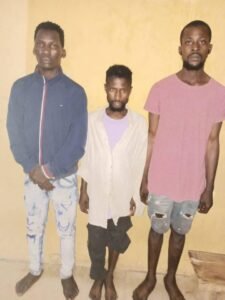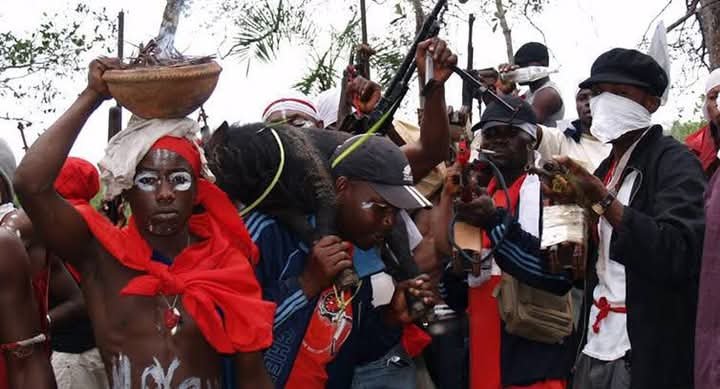Cultism-related violence has been on the rise in Lagos and several other parts of southern Nigeria, leaving behind a trail of blood, tears, and sorrow. Korede Abdullah, the South West correspondent for Africa Health Report (AHR), examines the growing menace and explores possible solutions to curb the crisis.
Blood on the Streets
When 16-year-old Mustapha joined a peace walk in the Ebute-Metta area of Lagos in April, he had hoped to be part of a movement promoting harmony and condemning cult violence. Tragically, the event meant to foster peace became a scene of horror when a suspected cultist opened fire during a heated confrontation.

Mustapha was shot dead on the spot, and the campaign leader sustained serious injuries. The community was left reeling from the shock, as the message of nonviolence was violently silenced.
His untimely death now stands as a chilling symbol of how noble causes can be shattered by unrestrained lawlessness. “We came out to preach peace,” said Yusuf Bamidele, a youth organiser who witnessed the chaos. “Instead, we buried one of our own.” The tragedy is one of the several incidents that occur on a regular basis.
Breeding Grounds of Chaos

Africa Health Report (AHR) findings show that cultism and crime are not confined to Ebute-Meta alone; they also pose significant challenges in Mile II, Surulere, Agege, Lagos Island, Cele, Ikorodu, and various other communities across Lagos. The state has become a hotspot for activities such as cultism, drug trafficking, armed robbery, carjacking, and kidnapping.
From Oyingbo to Mile II, from Surulere to Ikorodu, Lagos has become a microcosm of Nigeria’s descent into violent subcultures. Cultism has morphed from campus-based rivalry into a community-wide terror.

Experts trace this to the collapse of family values, unemployment, drug abuse, and a political system that nurtures criminal proxies. “Cultism thrives where values die,” said Prof. Olufayo, a sociology lecturer at the University of Lagos.
With rising idleness, especially among the urban poor, cult groups offer young people a warped sense of identity and belonging.
“My cousin joined the Future Guys gang because he had no job or mentor,” said Mrs. Rukayat Adeniyi, a resident of Agege. “Now he’s in jail in connection with the cult-related gang violence.”
The economy of crime—driven by extortion, robbery, and drug trafficking—offers quicker returns than school or skilled labour. The consequences are immediate: blood, fear, and the collapse of communal trust.
Blood and Books: YABATECH Horror
In a daring operation, the Lagos State Police Command apprehended eight suspects linked to a string of cult-related killings within Yaba College of Technology (YABATECH) and its environs. Yet, on the fateful day of April 29, 2025, the Lagos State Police Command, guided by sharp intelligence and resolute purpose, descended upon the heart of this darkness.

“Tactical operatives of the Lagos State Police Command have arrested eight suspects involved in several cult-related killings within Yaba College of Technology and its environs in an intelligence-led operation,” declared Benjamin Hundeyin, the command’s spokesperson.
Among those seized were Adeyemo Abdulsamad, known as Cloud, and Olamilekan Adeagbo, aka Skinny, their names now etched in the annals of justice alongside their cohorts—Afeez Enitan, Ayomide Daniel, Mayor Samson, Basit Ishola, Quadri Sikiru, and Mariam Salihu.
The haul from this daring operation was as chilling as the crimes themselves: a Beretta pistol, four 9mm rounds, a cartridge, two battle axes, and twin cutlasses—grim instruments of a dark craft. Yet, the story is far from closed.
Hundeyin’s voice resonated with both caution and resolve: “Investigation is still in progress to unravel the full extent of the suspects’ involvement in cult-related activities. Members of the public are assured that the suspects will be made to face the full wrath of the law.”
Thus, beneath the bright Lagos sky, the wheels of justice turn steadily, promising that the shadows that haunted YABATECH will be dispelled by the relentless light of law and order.
Eight Teenagers Nabbed in Ogun
In the quiet corridors of Ifo High School, where lessons should echo and dreams take root, a darker lesson was unfolding. The Ogun State Police Command announced on Saturday, March 22, the arrest of eight students—Omolaso Waris, Bennett Bolawatife, Aluko Taiwo, Akinola Ifeoluwa, Azeez Hassan, Kilani Babatunde (alias “Soldier”), Kehinde Aluko, and Fasedemi Samuel—suspected of engaging in cult-related activities under the veil of teenage innocence.

Their secret unravelled when the school’s Vice Principal, Mr. Alako Oluwole, and a teacher, Mr. Akinseku Oloruntoba Julius, raised the alarm. “On the 21st of March 2025, at about 1205hrs,” said Police Spokesperson CSP Omolola Odutola, “a group of students had been involved in cult-related activities, perpetuating disturbances and extorting valuables from fellow students.”
The accused youths reportedly confessed to being initiated into a clandestine group known as Future Guys (F.T.G.), allegedly led by two SSS1 students, Ebenezer Ope and Ebenezer Tobi.
What began as whispers among school desks has now drawn the full glare of law enforcement. “The Ifo Divisional Police officer, in collaboration with the authorities of Ifo High School, has apprehended eight students suspected of engaging in cult activities within the school premises,” Odutola stated.
With investigations underway, the suspects are set to be transferred to the State Criminal Investigation Department. But the story doesn’t end at arrest; it turns toward redemption.

Commissioner of Police, Lanre Ogunlowo, has summoned the students for further interviews, hinting at rehabilitation. “Referrals for counselling and mentoring will be organized,” he affirmed, urging parents, teachers, and community leaders to band together. “We must eradicate this cancer of cultism from our schools,” Ogunlowo declared, “before it devours the future we hope to build.”
Crime Without Borders
Cultism, once considered a localized menace in Nigeria, is now rearing its head on the global stage. Africa Health Report (AHR) gathered that in Australia, Nigerian-born Ugochukwu Anyakorah was sentenced to four years in prison for his involvement in a romance scam tied to the notorious Buccaneers cult group.
His conviction highlights how these criminal fraternities are extending their reach far beyond Nigeria’s borders, evolving into international crime syndicates with sophisticated operations.
“The export of cultism is a worrying trend,” said international crime analyst Tunde Koleosho. “It’s no longer just a Nigerian problem. It’s a global contagion.”
Authorities fear that as cult groups embed themselves in foreign communities, their influence could spark waves of organized crime, fraud, and violence in countries unprepared for their tactics and ideology.
Political Complicity and the Cry for Justice
Civic leaders have called on Governor Babajide Sanwo-Olu and Lagos Mainland LGA Chair Omolola Essien to stop feigning helplessness. “We need action, not silence,” said Comrade David Salami of the Community Justice Network.
“Deploy intelligence, arrest killers, prosecute sponsors—anything less is complicity.” The 2021 Lagos Cultism Law exists, prescribing up to 21 years imprisonment, yet enforcement remains timid.
Inside the Cult Economy
The killing of Wanemi Omubo, the feared leader of the Bobos cult group in Yenagoa, was not the result of a turf war with rival gangs—it was an internal coup, police say. “He was taken out by his own boys who wanted to take over,” confirmed Bayelsa State Commissioner of Police, Francis Idu, speaking to reporters after a security briefing.
Omubo’s assassination highlights a deeper, more organized structure within cult groups that extends beyond street-level violence. These groups operate with clear leadership hierarchies, designated revenue sources—often from extortion, protection rackets, and drug sales—and even planned succession.
According to Idu, this isn’t mere youthful rebellion. “What we are seeing here is organised crime with a militarised chain of command.”
Omubo, who had long been a name feared in Bayelsa’s underworld, had previously been arrested for illegal arms possession and suspected murder, but never faced serious prosecution. “He was let off due to influence,” Idu added, hinting at a web of political protection and compromised justice systems that allow cultism to thrive.
His death, while a major disruption in the Bobos’ chain of command, is unlikely to slow the group’s operations unless deeper systemic enablers are addressed. “These boys aren’t just fighting with machetes anymore. They are businessmen in crime, and leadership is violently contested,” Idu warned.
Cultists butchered our first sons like animals — Grieving fathers
Two grieving fathers in Bayelsa State have recounted the horrifying murders of their sons, both recent graduates of Niger Delta University, allegedly killed by suspected cultists in what appears to be a surge of violence across student communities.
Both fathers narrated poured in their grief in separate interviews with a national newspaper.

Thomas Synclair, a 56-year-old shoemaker, mourned his 21-year-old son, Ayakpo, who was ambushed while visiting an uncle in Bamotoro. “They dragged him out and butchered him as if he was an animal,” Synclair said tearfully.
“Eyewitnesses told me he jumped into a creek to escape, but the attackers pulled him out and killed him.” He lamented the delay by local vigilantes and called on the government to pursue justice: “If they deserve to be hanged, then so be it… if they are left alone, they’ll keep killing others.”
Similarly, 55-year-old Alfred Thomas, a builder, decried what he described as a slow and compromised response by the police after his 24-year-old son, Direala, was also murdered by cultists.
“The police caught the suspects in blood-stained clothes, yet they’re releasing them,” he said, his voice breaking. Thomas recounted how his son, already wounded, was denied medical help. “They begged the driver to take my son to the hospital; he refused. They had to push him in a wheelbarrow, but he died on the way.”
With deep anguish, he condemned the release of suspects and appealed to the authorities: “Let the law take its course. No amount of money can bring my son back. I leave everything to God.”
A Nation at War with Itself
From Auchi Polytechnic’s 58 cult-related expulsions to daily murders in Bayelsa, cultism is no longer a fringe issue. It’s a national crisis. At Niger Delta University alone, three recent graduates died in cult-related violence. “This isn’t about school anymore,” said activist Tina Ofor. “It’s about survival. Until leaders stop protecting sponsors, we are all targets.”
In Lagos, the story is just as grim. Earlier this year, police recovered five bodies in Ikorodu following a suspected clash between rival cult groups. “We live in fear,” said local resident Waliu Omosanya. “Our children are being recruited before they’re even teenagers.”
The Lagos State Police Command has admitted to arresting over 120 suspected cultists in just one month, yet convictions remain rare. According to Prof. Olufayo, “The system is compromised. Cultism thrives because of deep political connections and the silence of those in power.”
The culture of impunity extends beyond the streets into the corridors of government. In Rivers State, a whistleblower within the Ministry of Youth Development revealed under condition of anonymity that known cultists are sometimes appointed into youth leadership roles.
“It’s a vicious cycle,” the source said. “They use fear to control communities and votes during elections.” Meanwhile, youth groups and civil society organizations are calling for urgent reforms.
“We need a national task force on cultism, just like we have for terrorism,” said Peace Ogundele of the Safe Schools Coalition. “Until then, the bloodshed will continue.”
Bayelsa and Edo: Models of Crackdown
The crackdown on cultism has gained momentum across Southern Nigeria, with institutions and governments taking firm stands against the menace. At Niger Delta University, the directive to expel known cultists follows a series of violent clashes that left students injured and property destroyed.
Governor Douye Diri, reacting to the chaos, emphasized the need for urgent legal action. “Swift prosecution will serve as a deterrent to others who think they can disrupt our institutions with impunity,” he stated during a security meeting in Yenagoa on Friday. The university’s Senate is now working with law enforcement to identify and expel offenders, reinforcing a zero-tolerance policy on cultism.
Meanwhile, in Edo State, the newly signed anti-cultism legislation by Governor Monday Okpebholo marks a significant escalation in punitive measures. The law now allows the state to confiscate properties belonging to convicted cultists, a move aimed at dismantling the economic base of these criminal networks.
“We must treat cultists as enemies of the state,” Governor Okpebholo reiterated while signing the bill, adding, “This is a battle for the soul of our communities, and we will not back down.” Civil society groups and local traditional rulers have applauded the legislation, calling it a bold step in restoring peace and order in the state
Cultism’s Criminal Web
The persistent rise in cult activities across Nigeria has been closely linked to a web of other criminal enterprises, including drug trafficking, armed robbery, carjacking, and kidnapping. Security experts argue that cult groups often function as organized criminal networks, offering their members protection, identity, and access to illicit opportunities.
Mr. Opeyemi Oyerinde, a security analyst in an interview AHR, explains that “the primary motivation for many cult members is economic survival and power, which cultism facilitates through connections to drug rings and kidnapping syndicates.”
The allure of quick wealth and the absence of strong legal deterrents have made cultism a viable pathway for unemployed and vulnerable youths, particularly in urban centers like Lagos, Benin, and Port Harcourt.
Moreover, analysts highlight how cult groups act as enforcers or middlemen for drug cartels and armed robbers, enabling a cycle of crime that extends beyond campuses and inner cities.
According to security consultant Mr. Christianah Umeh, “cultists are often the foot soldiers who execute carjackings and abductions for ransom, making them integral to Nigeria’s expanding criminal underworld.”
She notes that the proliferation of small arms and the complicity of some law enforcement agents have emboldened these groups, allowing them to operate with impunity.
Security, Sports, and Sanity
Experts recommend revamping the Lagos Neighbourhood Watch and Amotekun Corps for more aggressive intelligence and patrols. Others suggest youth-focused alternatives.
“Lagos must invest in community sports and skill acquisition,” said Coach Seun Ogunlana of the Surulere Youth League. “Idle hands are the devil’s playground.” Involving celebrities, religious leaders, and community influencers in the anti-cult campaign is also crucial.
As cultism increasingly intersects with other high-risk crimes, stakeholders stress the urgent need for a multi-pronged intervention strategy combining youth empowerment, intelligence-led policing, and community vigilance.
Beyond Condolence: What Must Be Done

Those spoke with our correspondent concurred that cultism will not disappear with hashtags and condolence messages. They urged Governor Sanwo-Olu to champion the amendment of the Lagos 2021 Law to mirror Edo’s model.
They also suggested that intelligence-sharing among police, schools, communities, and vigilante groups must improve. “Prosecution should be swift and public. When cultists see consequences, the madness will stop,” said retired Retired ASP, Rufai Kazeem. Until then, Lagos risks becoming a city ruled not by law, but by fear.



